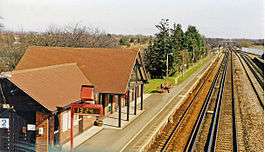Headcorn railway station
| Headcorn | |
|---|---|
 | |
| Location | |
| Place | Headcorn |
| Local authority | Borough of Maidstone |
| Grid reference | TQ837439 |
| Operations | |
| Station code | HCN |
| Managed by | Southeastern |
| Number of platforms | 2 (formerly 3) |
| DfT category | D |
|
Live arrivals/departures, station information and onward connections from National Rail Enquiries | |
| Annual rail passenger usage* | |
| 2010/11 |
|
| 2011/12 |
|
| 2012/13 |
|
| 2013/14 |
|
| 2014/15 |
|
| History | |
| 31 August 1842[1] | Opened |
| 19 May 1905 | Opening of the KESR |
| 1924–1930 | Remodelled |
| 4 January 1954 | Closure of the KESR |
| 2 April 1962[2] | Goods services withdrawn |
| 1988–1989 | Rebuilt |
| National Rail – UK railway stations | |
| * Annual estimated passenger usage based on sales of tickets in stated financial year(s) which end or originate at Headcorn from Office of Rail and Road statistics. Methodology may vary year on year. | |
|
| |
Headcorn is a railway station on the South Eastern Main Line serving the village of Headcorn in Kent, England. The station, and all trains serving it, is operated by Southeastern. Headcorn was, until 1954, the northern terminus of the Kent and East Sussex Railway.
History

Headcorn station was opened in August 1842 as part of the extension of the South Eastern Railway's (SER) main line from Tonbridge. In common with other SER stations outside the London area, staggered platforms and a simple single-storey wooden clapboard station building were provided at Headcorn. The SER's line was opened to Ashford by December 1842, to Folkestone by December 1843 and finally to Dover by February 1844.[3] A bridge between Headcorn and Staplehurst was the scene of an accident in 1865 involving Charles Dickens; a rail had been removed by a ganger mistaken as to the day, and the Staplehurst rail crash resulted.[4]
In 1905, the station became the northern terminus of Colonel Stephens' Kent and East Sussex Railway, the KESR's tracks entering Headcorn via a siding on the Ashford side of the station. The KESR had its own long platform to the rear of the Up main line platform, and a corrugated iron building was moved here from the KESR's Tenterden Town station.[5] The station, known as Headcorn Junction by the KESR, was remodelled between 1924 and 1930 by the Southern Railway (SR), with the addition of two new fast lines through the station. This involved the demolition of the main line Up platform, its reconstruction opposite the Down platform, and the moving of the KESR's connection to the main line to the west side of the station.[6] A new concrete KESR platform was provided here facing on a curved alignment.[7]

The remodelling included a footbridge across the station and new signal box for the main line and an SR signal for the KESR branch.[8] A connection was also provided between KESR metals and the SR Up loop line on the London side of Headcorn station, the KESR's facilities consisting by now of two loops and a siding.[9]
Following a decline in passenger and freight traffic, the KESR between Headcorn and Tenterden was closed to all traffic in 1954. Goods facilities were withdrawn from Headcorn in 1962,[2] and the goods yard became a car park. The SER's original buildings however survived until 1988 when they were swept away by British Rail as part of a modernisation scheme.[10] A new red-brick station building was officially opened on 11 May 1989 by Ann Widdecombe, then Maidstone's MP; shelters were provided for the platforms. In 1994, a new freight loop was built for Channel Tunnel Freight services.
Services
As of May 2010 the typical off peak services from this station are:
- 2tph (trains per hour) to London Charing Cross
- 1tph to Dover Priory and Canterbury West (dividing at Ashford International)
- 1tph to Ramsgate via Dover and Canterbury, dividing at Ashford[11]
| Preceding station | |
Following station | ||
|---|---|---|---|---|
| Staplehurst | Southeastern South Eastern Main Line |
Pluckley | ||
| Disused railways | ||||
| Terminus | British Railways Southern Region KESR |
Frittenden Road | ||
References
- ↑ Colonel Stephens Museum
- 1 2 Clinker, C.R. (October 1978). Clinker's Register of Closed Passenger Stations and Goods Depots in England, Scotland and Wales 1830-1977. Bristol: Avon-AngliA Publications & Services. p. 61. ISBN 0-905466-19-5.
- ↑ White, H.P. (1992). A Regional History of the Railways of Great Britain: Southern England (Volume 2). Nairn, Scotland: David St. John Thomas. pp. 28–30. ISBN 978-0-946537-77-8.
- ↑ Course, Edwin (1973). The Railways of Southern England: The Main Lines. London: B.T. Batsford Ltd. p. 38. ISBN 0-7134-0490-6.
- ↑ Garrett, Stephen (1999). The Kent & East Sussex Light Railway. Usk, Mon.: The Oakwood Press. p. 33. ISBN 978-0-85361-516-3.
- ↑ White, H.P. (1987). Forgotten Railways: South-East England (Forgotten Railways Series). Newton Abbot, Devon: David & Charles. p. 43. ISBN 978-0-946537-37-2.
- ↑ Scott-Morgan, John (2007). An Illustrated History of the Kent and East Sussex Railway. Hersham, Surrey: OPC Railprint. p. 59. ISBN 978-0-86093-608-4.
- ↑ Mitchell, Vic; Smith, Keith (1988). Branch Line to Tenterden. Midhurst, West Sussex: Middleton Press. p. Plate 114. ISBN 978-0-906520-21-5.
- ↑ White, H.P. (1987), p. 43.
- ↑ Kent Rail, "Headcorn".
- ↑ Network Rail Timetable May 2010: Table 207
External links
| Wikimedia Commons has media related to Headcorn railway station. |
- Train times and station information for Headcorn railway station from National Rail
- Headcorn station on "Subterranea Britannica"
- Headcorn station on "Kent Rail"
- Headcorn station in 1940, showing the K&ESR platform.
Coordinates: 51°09′56.70″N 00°37′37.89″E / 51.1657500°N 0.6271917°E